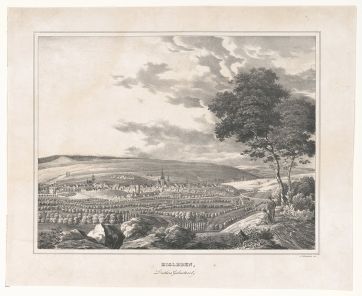The Raging Army and the Faithful Eckhart

The legend of the Raging or Angry Army and the Raging or Wild Hunt is known widely. It is tied to Wuotan, the highest of the old Germanic gods. And it derives its name from him, as the still commonly used word “Wuth” (“Rage, Anger”) indicates without a doubt and is derived from him in turn. The Raging Army is thought of as an army of the dead — as an unhallowed procession which consists of the souls of unbaptized dead children (like the one led by the Perchtl of Tyrol) as well the souls of all humans who have died a violent death. In the latter case, this is an echo of the earlier myths of the Einheriar, the fallen heroes of battle, who journey to Valhalla together with Odin.
According to the original myth, the troop was thus originally an army of war — an army of the strong, under male leadership — and an army of souls, an army of the meek and under female leadership. Later legends merged these, and only then did the third association appear — one of the hunt, as the final rejuvenation of the Raging Army.
With the hunt, it was easy to associate it with the Devil, the Helljäger (“Hell Hunter”), the hunter of souls. And thus, the Raging Army became infernal as well, its roaming was punishment, penance, similar to the penance in the fires of purgatory, whose locations on Earth itself were known and named. For this reason, the Huldenhöhle (“Hulda’s Cave”) at the Venus or Hör-Seelen Mountain were chosen as a site for the fires of purgatory by later legend. The Harz legend of the Wild Huntsman Hackelnberg, the Rhenisch tale of the Wild Count and Rhine Count (which was given a poetic treatment by Bürger), and all others who named the huntsmen are all latter-day reinventions. M. Johann Agricola states the following in his “Deutsche Sprichwörter” about the Wild Army in Thuringia:
“Amongst others, I have heard from the venerable Mr. Johann Fremderer, who is the parish priest at Mansfeld and more than eighty years old, that the Raging Army (as they called it) used to travel past Eisleben and the entire region surrounding Mansfeld. This occurred every year on Carnival Thursday. All the people gathered and waited for this event, just as if a powerful emperor or king was passing by. An old man walked in front of the mob. He carried a white staff, and always called himself the Faithful Eckhart. This old man admonished the people to move out of the way. He even told numerous persons to go home, for otherwise they would come to harm.
After this man, numerous people rode past, and numerous more walked, and people were seen who had recently died in those towns and villages, and some others who still lived. One rode on a horse with two legs. Another one had been bound on a wheel, and this wheel turned by itself. A third one had put one of his thighs above his shoulder and nevertheless was running quickly, and another one had no head, and so on and so forth.”
In this report, Agricola doesn’t mention the leader of the troop with even a single word, but by adding the text “When someone faithfully warns someone else of harm, and we want to praise it, then we say it with these words; You act like the Faithful Eckhart, for he too warns everyone of harm”, he too hints at the Hulda- and Eckhart-Legend which has already told above in tale nr. 42. But in other passages of the same book, Agricola touches upon the Hörseelberg mountain which is seen in part as a site of fiery purgatory, in others as an abode of the Wichtel, the little people, and furthermore as Venus Mountain. The relevant passages are:
“In the land of Thuringia close to Eisenach there is a mountain which is called the Hoselberg (or Hörseelberg). There, the Devil once provided a vision to carters who were transporting wine, and showed them how numerous people who were still alive and whom I had known were already sitting in the infernal flames. Near Jena at the Saale and within the domain of Honstein there are large mountains, and in these mountains many strange things were witnessed, and dwarves lived within them.”
It is clear that the presence of caves or holes is implied here. Immediately afterwards, the author mentions dwarves as helpful house spirits, and a local legend is presented which mentions that a “Hütchen” (“little hat”) lived in a village at the Hörseelenberg mountain. Such a “Hütchen” helped a farmer in his household in the most faithful manner so that the farmer’s wealth increased every day. Once, the farmer spotted the Hütchen how he strained to pull a piece of straw up the stairs to the attic. The farmer became enraged over this pointless labor, and shouted: “Damn you, you lazy rascal!” Immediately, the Hütchen turned invisible, but a large, long sack of grain became visible which four men had to lift and carry. This had been the piece of straw which the Hütchen had pulled up to the stairs by himself. The Hütchen was gone, and the farmer became a beggar. (D. S. B. 461)
After relating the old legend of the Faithful Eckhart as the patron of the Harlungens (D. S. B. 29), Agricola further mentions in the same place how “the Devil... has used all kinds of illusions and chicanery for this, just like with the Venus Mountain and the Hoselberg mountain. However, despite these chicaneries, the Germans have not forgotten their Faithful Eckhart who, as they say, sits in front of the Venus Mountain and warns everyone not to go inside.”
Source: Bechstein - Thüringer Sagenbuch Erster Band, p. 119ff